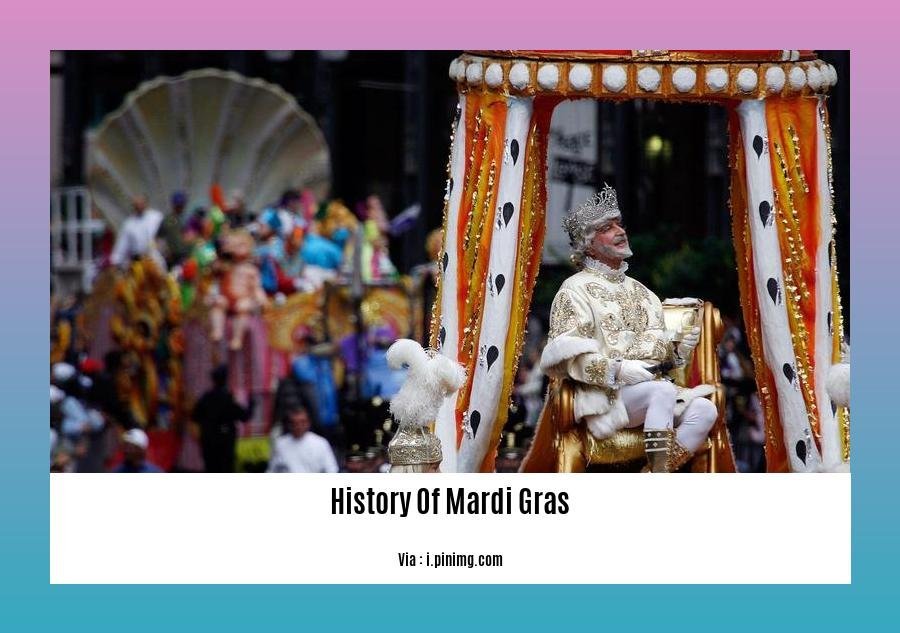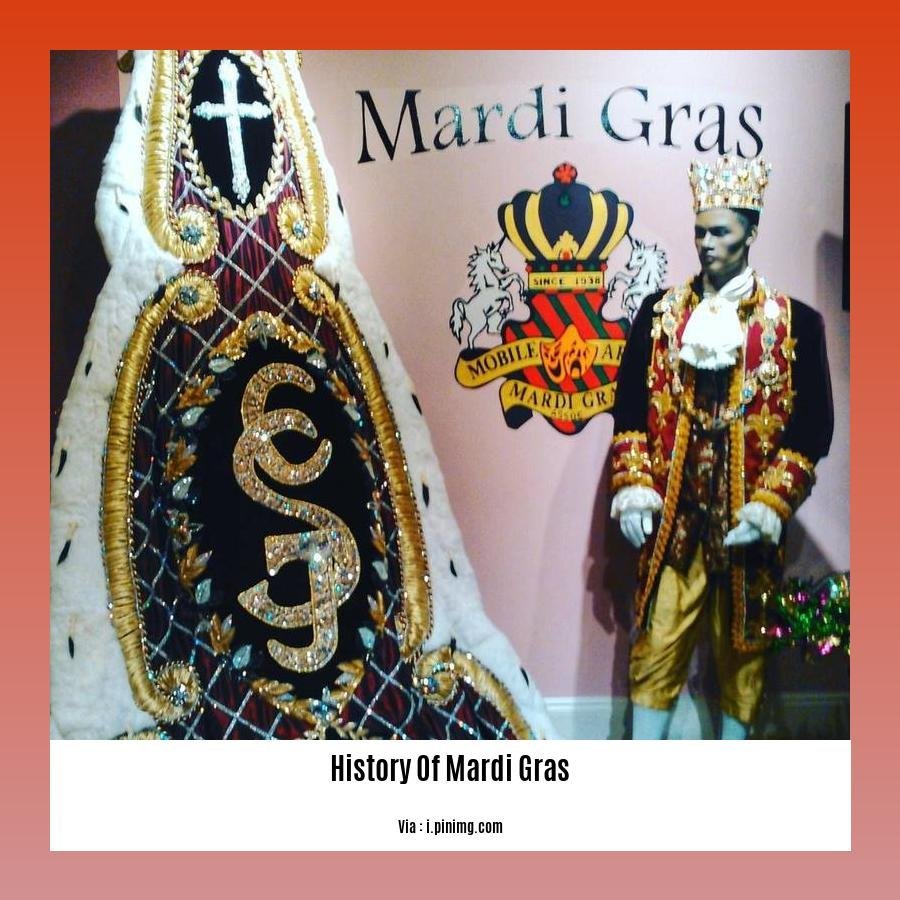[- The Enthralling History of Mardi Gras: A Cultural Odyssey -] Carnival season reaches its peak with the vibrant festivities of Mardi Gras, a celebration rooted in ancient rituals and medieval traditions. From its birthplace in Mobile, Alabama, to the elaborate parades and lively balls of New Orleans, Mardi Gras has evolved into a global phenomenon. Crowned with a King and Queen, the celebration embodies the spirit of indulgence before the solemn period of Lent. Elaborate parade floats, a staple of Mardi Gras, emerged in the 19th century, transforming the streets into a kaleidoscope of colors and creativity. Join us on an enthralling journey through the history of Mardi Gras, unraveling the captivating stories and cultural significance behind this beloved tradition.
Key Takeaways:
- Mardi Gras has ancient roots in pagan fertility rites.
- It’s celebrated before Lent in Catholic countries.
- Ancient Roman festivals like Saturnalia and Lupercalia influenced its development.
- Mardi Gras spread from Europe to France and then to French colonies, including Louisiana.
History of Mardi Gras


Mardi Gras, a vibrant celebration observed worldwide, boasts a rich and captivating history rooted in ancient pagan traditions. Its origins can be traced back to pre-Christian festivities honoring the changing seasons and fertility.
Ancient Roots
- Pagan festivals, such as the Roman Saturnalia and Lupercalia, celebrated the end of winter and the arrival of spring.
- These festivals involved revelry, feasting, and rituals associated with fertility.
Medieval Evolution
- During the Middle Ages, Mardi Gras evolved into a Christian holiday known as “Fat Tuesday.”
- It marked the last day before the Lenten season of fasting and penance, allowing people to indulge in food, drink, and merrymaking.
Expansion to Europe and Beyond
- From Medieval Europe, Mardi Gras spread to France, where it became a popular celebration, particularly in the city of New Orleans.
- French colonists brought Mardi Gras traditions to Louisiana, where the festival flourished and became a cultural cornerstone.
Today’s Celebrations
- Mardi Gras is now celebrated in many countries around the world, with unique variations based on local cultures.
- The festival typically involves parades, costumes, music, and feasting, reflecting its historical roots in pagan and Christian traditions.
Cultural Significance
Mardi Gras has profound cultural significance, representing:
- Cultural Exchange: It fosters cultural exchange between different communities and countries.
- Artistic Expression: The elaborate costumes, floats, and parades showcase artistic creativity and imagination.
- Community Bonding: It brings people together for a shared celebration of tradition and heritage.
Discover the intriguing French roots of Mardi Gras, where the vibrant festivities originated. Explore the lively traditions of Mardi Gras in New Orleans, where the streets come alive with music, costumes, and revelry. Trace the Evolution of Mardi Gras celebrations throughout history, from its ancient origins to its modern-day extravaganza.
4. Mardi Gras Has A King
Mardi Gras festivities are incomplete without the iconic figure of the King. Tracing its roots back to the medieval era, the tradition of crowning a Mardi Gras King has been a vibrant part of the celebration. In New Orleans, the tradition took hold in the 19th century, with the first official King of Mardi Gras crowned in 1870.
The selection of the King is shrouded in mystery and intrigue. Traditionally, the King is chosen by a secretive organization known as the Twelfth Night Revelers, who guard their identity with utmost secrecy. The King’s identity is revealed only on Mardi Gras Day, adding to the excitement and anticipation surrounding the event.
The King’s role is both ceremonial and symbolic. Riding atop a float, adorned in elaborate costumes and surrounded by his loyal court, the King presides over the Mardi Gras parades, spreading joy and revelry throughout the city. The King’s reign culminates in the symbolic handover of the keys to the city, a gesture that signifies the end of Mardi Gras and the beginning of the Lenten period.
Key Takeaways:
- The tradition of crowning a Mardi Gras King originated in medieval Europe.
- In New Orleans, the first official King of Mardi Gras was crowned in 1870.
- The King is chosen by a secretive organization known as the Twelfth Night Revelers.
- The King’s identity is revealed only on Mardi Gras Day.
- The King’s role is both ceremonial and symbolic, presiding over Mardi Gras parades.
Relevant URL Sources:
- History of the Mardi Gras King
- The King of Mardi Gras: A History and Tradition
6. Parade Floats Began In The 1800s
Mardi Gras parade floats, the vibrant centerpieces of this beloved celebration, have a rich history that dates back to the mid-19th century. They first emerged in New Orleans in 1857, when members of the Mistick Krewe of Comus borrowed floats from a New Year’s Eve parade in Mobile, Alabama. These early floats were simple and often horse-drawn, but they laid the foundation for the elaborate and dazzling creations we see today.
Over time, floats became more elaborate and intricate, showcasing the creativity and artistry of local designers. Papier-mâché was introduced in the 1880s, allowing for more detailed and lifelike designs. These floats became a symbol of Mardi Gras, representing the festival’s blend of art, culture, and community.
Key Takeaways:
- Mardi Gras parade floats originated in New Orleans in 1857.
- The first floats were borrowed from a New Year’s Eve parade in Alabama.
- Floats have evolved over time, becoming more elaborate and intricate.
- Papier-mâché was introduced in the 1880s for more detailed designs.
- Floats are an integral part of the Mardi Gras tradition, combining art, culture, and community.
Relevant URL Sources:
- 10 Fun Facts About Mardi Gras And Its History – Southern Living
- A brief history of New Orleans’ Mardi Gras floats: How they’re made and]
FAQ
Q1: Is it true that Mobile is the birthplace of Mardi Gras?
Q2: Does Mardi Gras have a King?
Q3: When did parade floats begin in Mardi Gras?
- Mastering Leader in Spanish: The Complete Guide - April 19, 2025
- Uncovering Surprising Parallels: England Size Compared to US States - April 19, 2025
- Old Mexico Map: Border Shifts 1821-1857 - April 19, 2025
















